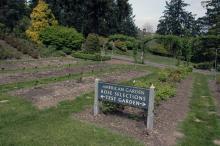See:
Apple (Malus spp.) - Replant Disease
Note: Replant diseases are complexes of biological and environmental factors that vary by geographic region. The problem appears to be important on roses in Europe but has not been recognized in the Pacific Northwest. This is a real disease complex in the PNW for many crops in the rose family including pome fruit, such as apple and pear, and stone fruit, such as cherry and peach. Similar problems exist for other crops such as strawberry (black root rot). The poor growth produced in replant situations would not be noticed unless you had a comparison. Roses planted into soil that has never grown roses (virgin soil), or on fumigated or sterilized soil, would produce much more luxuriant, vigorous growth than when the rose is replanted in an area that has grown roses for many years.
In the PNW, roses planted onto grounds that have grown roses before appear to grow fine. The Washington Park International Rose Test Garden in Portland OR reports that they routinely remove 1,000 plants every winter and replant 1,000 new ones. They have not noted a replant problem.
When replanting roses in the PNW, just follow planting guidelines that accompany your plants from the nursery. Correct any soil problems such as pH or drainage. You can also plant into new areas of your yard or nursery, or rotate out of rose crops for several years before planting roses again on the same ground or garden site.
Reference Yim, B., Baumann, A., Grunewaldt-Stöcker, G., Liu, B., Beerhues, L., Zühlke, S., Sapp, M., Nesme, J., Sørensen, S.J., Smalla, K., and Winkelmann, T. 2020. Rhizosphere microbial communities associated to rose replant disease: links to plant growth and root metabolites. Horticulture research, 7:1-16.

